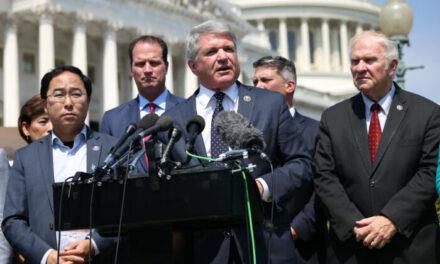We support our Publishers and Content Creators. You can view this story on their website by CLICKING HERE.
The amendment would cement a right to abortion in the state, at least to 22 weeks of pregnancy, and in some cases, much later.
A coalition of more than 300 Florida physicians and health care professionals is urging voters to reject a ballot initiative to establish a constitutional right to abortion in their state.
“Amendment 4 is bad medicine for women, it’s bad for children, bad for families,” said Dr. Richard Sandler, pediatrician and co-chair of Florida Physicians Against Amendment 4, at a Sept. 11 press conference in Orlando.
Florida currently restricts abortion after six weeks’ gestation, when a fetal heartbeat is usually detectable. Women can obtain abortions in cases involving rape, incest, and human trafficking up until 15 weeks of pregnancy. The procedure is also available until the third trimester if a fatal fetal abnormality is found and at any point during the pregnancy if the mother’s life is at risk.
The ballot initiative, Amendment 4, states that “no law shall prohibit, penalize, delay, or restrict abortion before viability or when necessary to protect the patient’s health, as determined by the patient’s health care provider.” The one exception the text allows for is parental notification for minors seeking abortions.
Fetal viability is typically recognized at around 22 to 24 weeks of pregnancy.
The text does not specify which health conditions would be considered valid reasons for late-term abortions.
Dr. Angeli Akey of Gainesville said the lack of definition means such procedures would effectively be allowed “for practically any reason” up until birth.
Akey also noted that the amendment would allow any “health care provider” to perform an abortion by removing Florida’s current requirement that all abortions be performed by a physician.
“A doctor needs to be involved, not only for complicated pregnancies but especially for second and third-trimester abortions, which are high-risk surgeries and would be allowed under this amendment,” she said. “Would you trust anybody but a doctor with a high-risk procedure?”
The group is also concerned that the amendment would erase current regulations protecting women and children, including parental consent requirements for minors—stricter than the “notification” the amendment allows—and a mandatory 24-hour waiting period to consider one’s decision to have an abortion.
‘Not a Quick and Easy Fix’
Christina, a pro-life advocate who did not share her last name, said abortion is a critical decision as, once made, it “cannot be undone.”
She said she experienced three unplanned pregnancies at the ages of 13, 14, and 19.
At age 13, she aborted her first child at 15 weeks’ gestation. The procedure, she said, “was terrifying.”
“I was extremely vulnerable, and it was horrifying to have a man perform something so invasive,” she said. “I still remember the tools, his hands—the suction sound was awful.”
Christina said she squirmed and cried throughout the abortion, and the doctor raised his voice to tell her to sit still.
“He was not at all compassionate,” she said, adding that her body never fully healed from the procedure.
Christina said she went on to battle feelings of deep anger and self-loathing and was told that the aftereffects of the abortion were likely responsible for the miscarriage that ended her second pregnancy and the severe complications she experienced in the third pregnancy while delivering her baby.
“This baby was my greatest ‘yes.’ She graduated from college, she’s getting married next month, and I have never regretted choosing life for her,” she said, holding back tears. “But I want other women and Florida voters to know that my abortion experience was not a quick and easy fix like it’s marketed and assumed.”
Barbara, another advocate, shared her two experiences with abortion—one at age 17 and the other at 33. She noted that she was advised to have the second abortion due to concerns she was at risk for colon rupture.
“My husband and I believed at the time we were making the safest decision for our family and for my life, but the horrific aftereffects and consequences have been unmatched,” she said.
Barbara said the person who performed her abortion was “very cold and impersonal,” and the clinic made no effort to follow up with her after the procedure.
“My body has paid the price with continuing medical conditions that wreak havoc on my life today,” Barbara said, recounting the mental and emotional trauma she has since been coping with.
“I think it’s important for other women to know how abortion negatively affects your life for years to come,” she said. “As you head to the polls in November, I would ask that you remember our stories and vote no.”
Opposing Views
Floridians Protecting Freedom, the yes campaign for Amendment 4, holds that the state’s current abortion law is “dangerous.”
In a new TV ad, the group said the law cuts off most abortions at a point before many women know they are pregnant or have seen a doctor.
Dr. Christina Francis, CEO of the American Association of Pro-life Obstetricians and Gynecologists, said that the amendment would “usher in an era of clearly substandard care.”
Francis, a board-certified OB-GYN, traveled from Indiana to Orlando to attend the press conference with her fellow doctors.
“Amendment 4 would make Florida one of the most dangerous places in the country for the women and girls that we care for, as well as for our fetal patients,” she said.
Enacting basic health and safety regulations to protect patients would be “near impossible” under the amendment, she said, and the state’s emergency rooms would be left to shoulder the burden.
Describing the amendment as “unnecessary and dangerous,” Francis said, “All medical professionals, whether for or against abortion, should agree that our patients deserve better.”
Amendment 4 will need to get 60 percent of the vote to pass.
Meanwhile, Florida officials are currently investigating claims that forged signatures were submitted with the petition to add the measure and wrongly verified by supervisors of elections. The state’s Office of Election Crimes and Security is reviewing signatures and questioning voters to determine whether that was the case.
The Associated Press contributed to this report.

 Conservative
Conservative  Search
Search Trending
Trending Current News
Current News 







